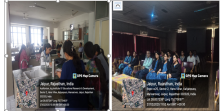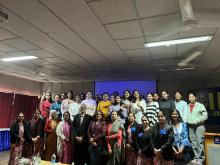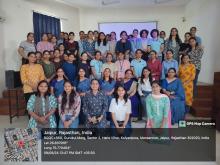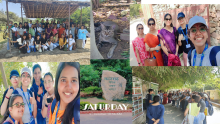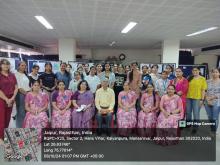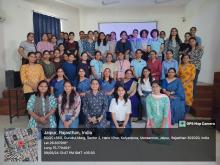Department News
We are delighted to announce that Dr. Anju Sharma, esteemed faculty member of the Department of Zoology, has been awarded a prestigious research project by the Department of Science and Technology (DST), Rajasthan in 2025.
The project is titled:
“Impact of Microplastics on Neurobehavioral and Neurodegenerative Changes in Diabetic Male Swiss Albino Mice with an Emphasis on Therapeutic Targets.”
This cutting-edge project reflects Dr. Sharma’s dedication to investigating emerging environmental threats like microplastics and their impact on neurological health, particularly in vulnerable diabetic models. The study aims to explore underlying mechanisms and identify potential therapeutic interventions.
The department congratulates Dr. Anju Sharma on this significant achievement and wishes her success in this meaningful scientific pursuit.
– Department of Zoology
The IIS (Deemed to be University), Jaipur
We are proud to announce that Dr. Neelu Kanwar Rajawat, faculty member of the Department of Zoology, has been awarded a prestigious research project by CSIR-ASPIRE in 2024.
The project is titled:
“Neuroprotective Potential of Microbial Derived Pharmacological Molecule for the Treatment of Parkinson’s Disease.”
This remarkable achievement highlights Dr. Rajawat’s continued contribution to cutting-edge research in neurobiology and microbial therapeutics. The project aims to explore innovative microbial solutions for managing neurodegenerative disorders, particularly Parkinson’s disease.
The department congratulates Dr. Neelu Kanwar Rajawat and wishes her great success in this impactful scientific endeavor.
– Department of Zoology
The IIS (Deemed to be University), Jaipur
The Department of Zoology extends its heartfelt congratulations to Ms. Manisha (Ph.D.), Ms. Nehal (P.G.), and Ms. Priyanshi (P.G.) on their remarkable achievement of clearing the CSIR-NET (JRF) examination.
Your hard work, dedication, and academic excellence have brought pride to the department and serve as an inspiration to your peers. We are confident that this success will open new avenues for your research and professional journey.
Wishing you continued success in all your future endeavors!
– Department of Zoology
The IIS (Deemed to be University), Jaipur
In order to celebrate Science day, Department of Zoology organized two exciting activities Best Out of Waste and Movie Screening on 27th February, 2025, aimed at promoting creativity, scientific thinking, and awareness about environmental sustainability. The first activity, "Best Out of Waste," was organized in the Department of Zoology at 9:30 AM. This event encouraged students to use waste materials and transform them into innovative and useful creations. The purpose of this activity was to inspire students to think creatively while also raising awareness about recycling and reusing materials to reduce environmental waste. A total of 22 students participated in this activity, showcasing their artistic skills and environmental consciousness by designing unique items from waste materials. The creations ranged from decorative pieces to functional items, all made with recyclable and discarded materials. The event not only provided a platform for students to express their creativity but also helped them realize the value of sustainability and the importance of reusing materials in everyday life.
The second event of the day was a movie screening, which took place at 10:30 AM in the AV Hall. The movie “Life Before Birth - In the Womb” was selected for the screening. This documentary explored the fascinating journey of human development from conception to birth, offering an in-depth look at the biological processes involved in fetal development. The movie was not only educational but also captivating, providing students with a deeper understanding of life science, embryology, and the complexity of human growth. The movie sparked thoughtful discussions among students about the importance of prenatal development and the scientific aspects of life before birth. It served as an insightful learning experience, aligning perfectly with the theme of the day and further encouraging students to appreciate the wonders of life science.
The Department of Zoology organized a guest lecture on February 7th, 2025, entitled "Job Opportunities in Clinical Research," delivered by Dr. Kanika Malhan at 12:15 pm in the AV hall. The session was attended by M. Sc. and PhD students. Dr. Malhan discussed various career opportunities in clinical research, such as roles of Clinical Research Associate, Data Analyst, Statistical Officer and Medical Content Writer etc. She also acquainted the students with qualifications and skills required for these positions. The session was informative, engaging and interactive. Students actively participated and asked questions about career prospects, certifications, and industry trends. Dr. Malhan's engaging presentation offered students valuable insights and guidance, making the lecture a truly enriching experience for all attendees.
A renowned gynaecologist, obstetrician, and in vitro fertilization (IVF) expert from Jaipur's Astha Fertility Centre, Dr. Namita Kotiya, gave an inspiring discussion on "Empowering Women in Healthcare" on September 9, 2024. The talk included menstruation, fertility age, dietary habits, pregnancy, HPV, and menopause. Attendees included a wide range of academic levels, from undergraduates to postgraduates to PhD candidates from Department of Zoology. The talk was engaging and explained clearly. Moreover, Dr. Kotiya successfully addressed a wide range of questions from students. The event received a positive response, successfully increasing awareness and equipping women with practical skills to effectively manage their health.
As part of the National Wildlife Week celebration, the Department of Zoology, IIS (Deemed to be University), Jaipur, organized an educational visit to Nahargarh Zoological Park on 5th October 2024. A total of 52 undergraduate (UG) and postgraduate (PG) students, along with research scholars, participated in this visit. The primary objective of the visit was to provide students with an opportunity to understand the significance of wildlife conservation and forest preservation. The visit aimed to: Educate students on wildlife rehabilitation and conservation efforts, enhance understanding of forest conservation and its ecological importance, explore the diverse flora and fauna housed within the zoological park, engage students in interactive exhibits to promote experiential learning.
During the visit, students had the opportunity to observe and learn about various species of wildlife. Some of the key species encountered included: Big Cats: Royal Bengal Tiger, Lion, Leopard; Small Carnivores: Jungle Cat, Palm Civet, Honey Badger; Deer Species: Spotted Deer, Sambar Deer, Barasingha Deer. The students actively participated in discussions regarding the behavior, habitat, and conservation status of these species. The zoological park authorities provided insightful information on the role of zoological parks in the conservation of endangered species, captive breeding programs, and ecological balance.
The visit proved to be an enriching experience for the students as they: Gained a deeper understanding of wildlife rehabilitation and the challenges involved. Learned about conservation strategies employed to protect flora and fauna. Developed an appreciation for the importance of biodiversity and its role in ecosystem stability. Engaged with interactive exhibits that provided a hands-on learning experience.
The educational visit to Nahargarh Zoological Park was a valuable initiative that successfully aligned with the objectives of National Wildlife Week. It provided students with a comprehensive understanding of wildlife conservation, forest preservation, and the significance of ecological balance. Such visits play a crucial role in fostering environmental awareness and encouraging students to contribute to conservation efforts in the future.
The Department of Zoology organized a poster-making competition on 8th October, 2024, in order to celebrate National Wildlife Week (2nd October to 8th October, 2024). The competition was open to B.Sc., B.Sc. (Hons.), and M.Sc. students across all semesters. The poster preparation took place from 10:00 a.m. to 12:00 p.m., followed by the display and judging at 12:30 p.m. The event was held in the Zoology Laboratory.
The topics for the poster competition were as follows:
- Connecting People & Planet: Exploring Digital Innovation in Wildlife Conservation
- Wildlife Family Practices
- Human-Wildlife Co-existence
- Endangered Species Awareness
- Human-Wildlife Conflict
A total of 40 students of B. Sc.(P), B. Sc. (H) and M.Sc Zoology participated in the competition.
The following students' posters were appreciated and awarded certificates:
|
RANK |
NAMES OF STUDENTS |
||
|
SOLO |
GROUP |
||
|
I |
Sakshi (M.Sc. Sem 3) |
|
|
|
II |
Nidhi Singh (M.Sc. Sem 3) |
Komal, Akshita Jain, Parul Gurjar (M.Sc. Sem 1) |
|
|
III |
Priyanshi Singh (M.Sc. Sem 3) |
Bhoomi Harjani (B.Sc. Sem 1) |
Harshita Sethi, Kanishka Joshi, Navshree Sharma (B.Sc. Sem1) |
|
Consolation |
Prachi Soni (B.Sc. - Honours Sem 3) |
Nehal Khandelwal (M.Sc. Sem 3) |
Meena Choudhary, Harshita Makhija, Nancy (M.Sc. Sem 1) |
An awareness session was organized by Department of Zoology on "Empowering Women in Healthcare" on September 9, 2024. 72 students and 5 faculty members from Department of Zoology attended the session. A renowned gynaecologist, obstetrician, and in vitro fertilisation (IVF) expert Dr. Namita Kotiya from Astha Fertility Centre in Jaipur delivered an insightful talk on various aspects of female reproductive health. She covered key topics such as menstruation, fertility age, dietary habits, pregnancy and menopause. Dr. Kotiya stressed the importance of self-examination, mammography, regular Pap smears and HPV vaccination for early detection and prevention of breast and cervical cancer. Overall, Dr. Kotiya's session provided a comprehensive overview of women's reproductive health, emphasizing preventive care, early detection of diseases, and lifestyle management throughout different life stages.





